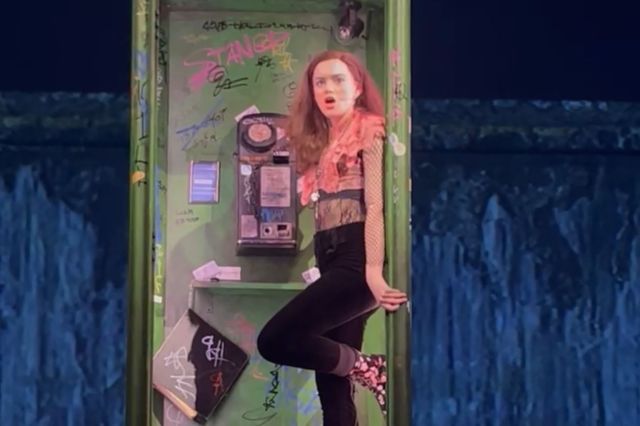”A Play for the Living in a Time of Extinction” at the Barbican Theatre – review
In the midst of an emergency, one woman takes to the Barbican’s stage alone. She tells us this isn’t the show we were meant to see, but duty calls. A performer’s mother is dying in hospital, so tonight only she can talk to us about what’s happening in a larger sense: the climate emergency. She’ll do her best.
In director Katie Mitchell’s hands, this iteration of A Play for the Living in a Time of Extinction at the Barbican is an off-grid, low-wattage, bicycle-powered demonstration of making theatre more sustainably: it’s also location-specific, and the tour of it seen at other UK venues later will have different designers and directors attached. It’s far from the only eco-conscious way of doing things, with other great industry efforts resulting in the Theatre Green Book, but it’s an impressive challenge and example.
Naomi (whose confidence identifying herself as a dramaturg belies the play’s American origins, by playwright Miranda Rose Hall, more than anything else) takes the task of filling the show’s slot onto her own shoulders. She’ll convert facts into performance. We stay in a comfortable state of disarm, steered by Lydia West’s eminently personable turn, presenting her research with precision and passion in equal parts. West is such a gorgeous performer that you can’t help wanting to see more of Naomi, to be allowed closer to who she is, but the show’s professedly “makeshift” nature is kept as the slightest of familiar meta-theatrical pretexts, never threatening to develop into a weightier plot.
Flanked by a ten-strong team of stolid cyclists and accompanied by BSL interpreter Rachel, West conducts us as Naomi through the story of our planet’s creation, through previous mass extinction events, up to now. Memories of her own mother, her own trees, bubble up sometimes. “I can’t even tell you how many times my life has been saved,” she tells us: all individual survival serves as a reminder of what’s collectively at stake as the sixth mass extinction event approaches.
Paul Clark’s sound design and composition is often cavernous, sometimes friendly, sometimes channelling the horror Naomi tries to convey: under it runs the smooth clicks and whirring of the cycling, a comforting presence. As Naomi runs us through the IUCN Red List of Threatened Species, we don’t hear the animals’ calls or the wind in the trees, but it’s as if the sound does react to the footage we see on two lowered screens. She exists in a largely black nothing, like what was there before our planet in her description, and perhaps what threatens again; Bethany Gupwell’s direct LED tracing of the lines of Moi Tran’s set focuses all our attention on West.
Unlike in Mitchell’s famous other climate crisis lecture-theatre piece, Ten Billion at the Royal Court in 2012, which ended on the reflection that the best advice for those having children now is to teach them how to shoot a gun, Naomi is resolute that there’s hope: “It’s not inevitable.” This isn’t a play interested in telling us what actions (direct or otherwise) that hope leads to, ending instead with a blessing, sung by the Citizens of the World Choir, and a wish for “good deaths” for us all.
It sounds dreary – it isn’t, though it’s a little vague. The lasting impression is of gentleness: gentle audience participation, an intent and careful hold on our attention, a gentle exhortation to take notice of what’s happening now and what is two-thirds gone already. West is absolutely arresting, though isn’t allowed to take us anywhere more interesting or controversial. It feels as if we’ve only just begun to scratch the surface of the rage and loss, and it isn’t a long, full-bodied scratch drawing blood which satisfies. The challenge of the staging feels matched by its form or message, and I don’t think this easy 70 minutes is a purposeful dramaturgical trick meant to leave us wanting more, priming us to resist complacency on this issue. West and Mitchell would be more than equal to going further, but A Play for the Living in a Time of Extinction goes down supremely neatly.

















